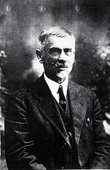Winogradsky, Sergei Nikolaevitch
| Topics: |
Sergei Nikolaevitch Winogradsky (1856-1953) was a Russian microbiologist who discovered the ability to produce organic compounds using energy contained in inorganic molecules (1887). He showed that the intracellular sulfur granules found in the marine bacteria Beggiatoa resulted from the oxidation of H2S for energy and that the bacteria used carbon dioxide as a carbon source. This work established the existence of chemoautotrophs, which Winogradsky called "anorgoxydants." One of the strategies that Winogradsky employed to isolate organisms from nature was a miniature model pond cross section which has since been called a Winogradsky column. This enrichment culture technique is now a staple in environmental microbiology. In the late 20th century, there was renewed interest in the work of Winogradsky due to recognition of the role of microbial ecosystems in bioremediation and agriculture.
Further Reading
- Encyclopaedia Britannica. Sergey Nikolayevich Winogradsky.
